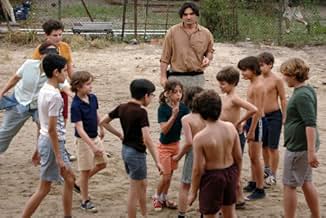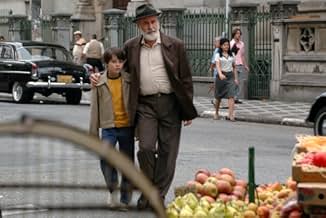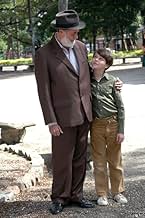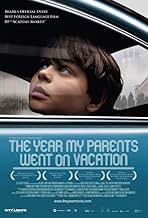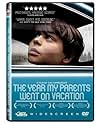L'année où mes parents sont partis en vacances
Titre original : O Ano em que Meus Pais Saíram de Férias
ÉVALUATION IMDb
7,3/10
6,8 k
MA NOTE
Un garçon est laissé seul dans un quartier juif en 1970, année de la coupe du monde et de la dictature brésilienne.Un garçon est laissé seul dans un quartier juif en 1970, année de la coupe du monde et de la dictature brésilienne.Un garçon est laissé seul dans un quartier juif en 1970, année de la coupe du monde et de la dictature brésilienne.
- Prix
- 32 victoires et 38 nominations au total
Avis en vedette
10wel2005
Fernando Meirelles is the producer and Cao Hamburguer the director. Daniel Rezende (also from City of God) is the editor. But there is no violence, only sadness and sensibility in this movie. Tells the history of Mauro, a twelve years old boy that sudden has to stay by himself. Because of the dictatorship his parents lives him.It's happens in 1970, during the soccer world cup. The screenplay, written by Bráulio Mantovani (also from City of God) and other two writers and Cao Hamburguer, avoids sentimentality. With intelligent mix of the ordinary life and the heavy atmosphere, the movie offers moments of spontaneous geniality. Music and cinematography is also very good. I saw it during the São Paulo cinema Festival. It's open in Brasil in November. With the quality of the movie, for sure is going to open also in the USA.It's a movie to everybody.
"O Ano em Que Meus Pais Saíram de Férias" is the most important Brazilian export of 2007, and as many said, a strong contender for the Academy Awards. The movie was beautiful: the cinematography, the music, the actors. The scenery was perfectly created and it looked perfectly like São Paulo and Brazil in the 1970's. With all that, the movie still failed to excite me or create any major emotion. The movie was very flat, and ran without a climax. Plus I wasn't very familiar with the 70's history, and the fact that the movie doesn't go deeper into the issues of the time got me a bit confused. I recommend a little researching prior to watching the movie. Overall, the movie was OK, but the characterization should have been developed further and some kind of bigger conflict should have brought excitement to the movie.
In 1970, near the World Cup, Daniel Stern (Eduardo Moreira) and his wife Miriam (Simone Spoladore) leaves Belo Horizonte in a hurry and scared with their ten years old son Mauro (Michel Joelsas) in their Volkswagen. While traveling to São Paulo, the couple explains Mauro that they will travel on vacation and will leave Mauro with his grandfather Mótel (Paulo Autran). Daniel promises to return before the first game of the Brazilian National Soccer Team in the Cup. The boy is left in Bom Retiro, a Jewish and Italian neighborhood, and waits for Mótel in front of his apartment. When the next door neighbor Shlomo (Germano Haiut) arrives, he tells the boy that Mótel had just had a heart attack and died. Alone and without knowing where his parents are, the boy is lodged by Shlomo and the Jewish community. Through the young neighbor Hanna (Daniela Piepszyk), Mauro makes new friends, cheers for the Brazilian team and sees the movement of the police and militaries on the streets while waiting for his parents.
In 1970, 90 millions of Brazilians were cheering for the National Soccer Team in the World Cup while the dictatorship had the toughest and cruelest moment against the opposition. I found this touching and sensitive movie amazing, since the director Cao Hamburger was able to brilliantly work with amateurish children and achieve outstanding performances, exposing the political situation of that milestone of Brazilian contemporary history through the eyes of a middle-class boy of ten years old. For me, it is absolutely impressive because I had approximately the same age of Mauro in 1970 and I lived that moment going to school, playing soccer and buttons, going to the beach and to the movie theater and cheering for our National Soccer Team without knowing or understanding clearly what was happening. The story is very simple and dramatic, but never corny, and the very convincing performances of the cast is awesome and touching. Michel Joelsas and Daniela Piepszyk have key roles in the story and I dare to write that two stars are born. My vote is ten.
Title (Brazil): "Ano em Que Meus Pais Saíram de Férias, O" ("The Year When My Parents Went on Vacation")
In 1970, 90 millions of Brazilians were cheering for the National Soccer Team in the World Cup while the dictatorship had the toughest and cruelest moment against the opposition. I found this touching and sensitive movie amazing, since the director Cao Hamburger was able to brilliantly work with amateurish children and achieve outstanding performances, exposing the political situation of that milestone of Brazilian contemporary history through the eyes of a middle-class boy of ten years old. For me, it is absolutely impressive because I had approximately the same age of Mauro in 1970 and I lived that moment going to school, playing soccer and buttons, going to the beach and to the movie theater and cheering for our National Soccer Team without knowing or understanding clearly what was happening. The story is very simple and dramatic, but never corny, and the very convincing performances of the cast is awesome and touching. Michel Joelsas and Daniela Piepszyk have key roles in the story and I dare to write that two stars are born. My vote is ten.
Title (Brazil): "Ano em Que Meus Pais Saíram de Férias, O" ("The Year When My Parents Went on Vacation")
O Ano em Que Meus Pais Saíram de Férias (THE YEAR MY PARENTS WENT ON VACATION) is an amazing little film from Brazil written by Adriana Falcão and Claudio Galperin and directed with panache by Cao Hamberger. It tackles many important issues (political upheaval, religion, ghettos, soccer, aging and more) while telling a very tender story about a young lad forced into a change of life that builds his character and his appreciation for the global community. It works on every level.
The year is 1970, the place is São Paulo during the World Cup Soccer Games, and we meet the young Mauro (Michel Joelsas) as he is swept away from his home by his frantic parents to live in São Paulo with his grandfather: his parents tell him they are going on 'vacation' while in reality they are escaping the dictatorial 'disappearances' that challenged the Brazil of the time. The grandfather lives in the Jewish ghetto and Mauro soon discovers that his would be host has just died. He meets the adjoining neighbor, grumpy old Shlomo (Germano Haiut), who begrudgingly takes Mauro in and allows him to pursue his obsession with soccer. The story winds through the disparities of Jewish life and the governmental changes that are disrupting the flow of this important year for Brazil (there are many film clips of the famous player Pelé which add to the tenor of the story), and as Mauro makes friends with a little girl Hanna (Daniela Piepszyk) the two children are confronted with the realities of political strife and the glories of Brazil's World Cup. By keeping the narrative (in Portuguese, Yiddish and German) to a minimum the beauty of viewing the world and its incongruities through the eyes of children becomes even more touching.
This is one of those films that allows us a vantage of longstanding problems and gives us a fresh view - a factor that helps our understanding of traumas of the history and awareness of similar traumas of the present. Hamberger delivers it with tenderness and is greatly assisted by the artistic cinematography of Adriano Goldman and the musical score by Beto Villares. It is a film well worth seeing at least once! Grady Harp
The year is 1970, the place is São Paulo during the World Cup Soccer Games, and we meet the young Mauro (Michel Joelsas) as he is swept away from his home by his frantic parents to live in São Paulo with his grandfather: his parents tell him they are going on 'vacation' while in reality they are escaping the dictatorial 'disappearances' that challenged the Brazil of the time. The grandfather lives in the Jewish ghetto and Mauro soon discovers that his would be host has just died. He meets the adjoining neighbor, grumpy old Shlomo (Germano Haiut), who begrudgingly takes Mauro in and allows him to pursue his obsession with soccer. The story winds through the disparities of Jewish life and the governmental changes that are disrupting the flow of this important year for Brazil (there are many film clips of the famous player Pelé which add to the tenor of the story), and as Mauro makes friends with a little girl Hanna (Daniela Piepszyk) the two children are confronted with the realities of political strife and the glories of Brazil's World Cup. By keeping the narrative (in Portuguese, Yiddish and German) to a minimum the beauty of viewing the world and its incongruities through the eyes of children becomes even more touching.
This is one of those films that allows us a vantage of longstanding problems and gives us a fresh view - a factor that helps our understanding of traumas of the history and awareness of similar traumas of the present. Hamberger delivers it with tenderness and is greatly assisted by the artistic cinematography of Adriano Goldman and the musical score by Beto Villares. It is a film well worth seeing at least once! Grady Harp
An absolutely beautiful film. We cried and we laughed. The boy is so cute and charming, but he still acted like a man when he had to. I'm telling all my friends about this little gem of a film. The political setup is based on very real events in Brazil at the same time that the international soccer star, Pele, was given an almost godlike stature in that country. The way the filmmakers manage to weave the political story, the personal story - of a boy waiting to be reunited with his parents - and the cultural "shock" of discovering the boy's Jewish roots was outstanding and very moving for me. I think this is a little gem, a masterpiece that will be enjoyed for years to come, like a Cinema Paradiso.
Le saviez-vous
- AnecdotesBrazil's Official Submission to the Best Foreign Language Film Category of the 80th Annual Academy Awards. The film was one of the nine films that made it to the January's short list but failed to secure the nomination.
- GaffesWhen Mauro arrives in São Paulo, he looks out to the car window noticing the tall buildings - the known Banespa Tower (now Farol Santander) and the Marchetti building, located in the city's downtown. Not only it's a shot on reverse but completely unpractical to the place he and his parents were going - Bom Retiro is located below downtown - and the particular area they were going, shot from right to the left, is completely off traffic since it's an one-way street that only moves from left to right.
- ConnexionsFeatured in Por Dentro do Filme 'O Ano em que Meus Pais Saíram de Férias' (2006)
Meilleurs choix
Connectez-vous pour évaluer et surveiller les recommandations personnalisées
Détails
- Date de sortie
- Pays d’origine
- Langues
- Aussi connu sous le nom de
- The Year My Parents Went on Vacation
- Lieux de tournage
- sociétés de production
- Consultez plus de crédits d'entreprise sur IMDbPro
Box-office
- Budget
- 3 000 000 R$ (estimation)
- Brut – États-Unis et Canada
- 807 117 $ US
- Fin de semaine d'ouverture – États-Unis et Canada
- 80 655 $ US
- 17 févr. 2008
- Brut – à l'échelle mondiale
- 3 218 370 $ US
- Durée
- 1h 50m(110 min)
- Couleur
- Mixage
- Rapport de forme
- 1.85 : 1
Contribuer à cette page
Suggérer une modification ou ajouter du contenu manquant







